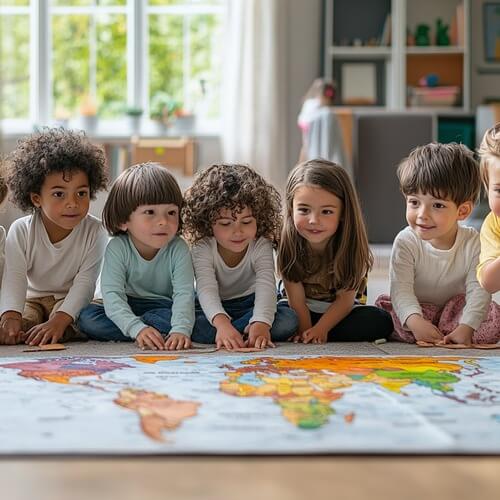Montessori School: What It Is, How It Works, and Whether It’s Right for Your Child
So, you're curious about Montessori school—maybe you've heard friends rave about it, or maybe you're exploring all the options to give your child the best start in life.
Wherever you're starting from, welcome. You're in the right place.

Let’s take a friendly but close look at what a Montessori school really is, how it compares to traditional schooling, whether it’s worth it, and what it might cost.
Along the way, I’ll answer all those burning questions you’ve probably Googled, like:
- What is a Montessori school?
- What is the Montessori method?
- Montessori vs traditional education—what’s the difference?
- Is Montessori good for my child?
- What are the pros and cons?
- Is it worth it?
- How much does it cost?
What Is a Montessori School, Really?
A Montessori school is an early or primary childhood school that uses a unique educational philosophy developed by Dr. Maria Montessori over 100 years ago.
Instead of traditional teaching techniques like lectures and worksheets, Montessori schools focus on child-led learning, hands-on activities, and independence.
Children choose what they want to work on (within a structured framework), and teachers act more like guides than traditional instructors.
Key Features:
- Multi-age classrooms (usually spanning 3 years)
- Freedom within limits — children choose their preferred activities, but there are rules
- Hands-on learning materials designed for exploration and discovery
- Teacher as a guide, not a lecturer
- Emphasis on independence, self-direction, and intrinsic motivation
Montessori is about respect—respect for the child and their pace, as well as their interests. That’s a big reason why so many parents fall in love with the approach.
What Is the Montessori Method?
The Montessori method is not just a set of teaching tools—it’s a whole philosophy about how children learn best.
Dr. Montessori believed that children are naturally curious and capable of learning independently if placed in the right environment.
Here’s what makes it different:
- Prepared Environment: The classrooms are specifically designed to encourage freedom and movement, with carefully chosen materials.

- Sensitive Periods: Recognizes key developmental windows when kids are more open to learning certain skills.
- Self-Correction: Materials are designed so children learn from their own mistakes.
- Intrinsic Motivation: There are no gold stars or grades passed out—kids simply learn for the joy of learning.
This method is used from infancy through elementary and even middle school in some programs.
Let’s break it down with a quick side-by-side comparison:
Montessori vs Traditional Education: What’s the Difference?
| Feature | Montessori School | Traditional School |
|---|---|---|
| Classroom Setup | Child-sized, activity-based, movement-friendly | Rows of desks, teacher-led |
| Curriculum | Individualized, child-led | Set curriculum, same for all students |
| Grades | No letter grades or tests | Regular testing, report cards |
| Teacher Role | Guide or observer | Instructor or lecturer |
| Pace | Self-paced | Teacher-directed schedule |
| Age Grouping | Multi-age (e.g., 3–6 years) | Same-age classrooms |
In short: Montessori is less rigid, more respectful of individual learning styles, and deeply focused on developing independence and critical thinking.
What are the ages of children who attend Montessori School?
Montessori schools typically serve children from birth to age 12, with some programs continuing through age 18. The most common age group is 3 to 6 years old (the “primary” level), where many families first encounter the Montessori method.
Infant/Toddler Program
- Ages: 6 weeks to ~3 years
- Focus: Care, movement, sensory exploration, early independence
- Not all Montessori schools offer this level, but it's growing in popularity.
Primary (Preschool/Kindergarten
- Ages: 3 to 6 years
- Focus: Practical life skills, early literacy and math, sensory learning
- This is the most common and well-known age group in Montessori.
Elementary Program
Ages: 6 to 12 years
Divided into:
- Lower Elementary: 6-9 years
- Upper Elementary: 9-12 years
- Focus: Collaborative work, research projects, deeper exploration of language, math, science and culture.
Is Montessori Good for My Child?
That depends really, what are your child’s needs, personality and your family values.
Montessori is a great fit for children who:
- Are curious and love to explore
- Thrive in calm, structured environments
- Enjoy independent play and concentration
- Need more time to master a skill without pressure
- Prefer one-on-one or small-group activities
It may not be ideal if your child:
- Needs more direct instruction or high energy stimulation
- Struggles with open-ended choices or transitions
- Is better motivated by external rewards like grades or praise
But remember: Montessori is flexible. Many children who seem unlikely candidates actually thrive in Montessori once they settle into the rhythm.
Montessori School Pros and Cons
Pros:
- Encourages independence and self-motivation
- Respects each child’s unique pace
- Builds real-world life skills (like cleaning up, tying shoes, problem-solving)
- Fosters deep focus and concentration
- Less academic pressure and more joy in learning
Cons:
- Can feel too unstructured for some families
- Not every Montessori school follows the philosophy with fidelity (some are “Montessori-inspired” but not trained)
- Fewer assessments may make it hard to track progress if you're used to traditional systems
- May be less affordable or not available in your area
No system is perfect. The best education is one that meets your child where they are—and that includes how well you connect with the school community.
Montessori School Cost: What to Expect
Let’s talk numbers, because Montessori isn’t always cheap.
Typical Costs in the U.S.:
- Preschool (3–6 yrs): $7,000 – $15,000/year
- Elementary: $9,000 – $20,000/year
Costs vary based on:
- Location (big cities = higher tuition)
- Whether the school is private, public, or charter
- Program duration (full day vs half day)
Pro Tip: Some public Montessori programs are free, but have waitlists. Others offer sliding scale tuition or financial aid—so definitely ask!

Is Montessori School Worth It?
This is such a personal question. The short answer is: If it aligns with your child’s learning style and your family’s values—yes, it can absolutely be worth it.
Many parents say their kids:
- Became more confident and independent
- Developed a love of learning
- Picked up practical life skills earlier than peers
But others find that the looser structure doesn't work for their child, or they prefer the more familiar feel of a traditional school system.
Like any investment, it comes down to fit and follow-through. Your best bet is to visit the school, meet the teachers and observe the classrooms. If it feels like home, you’ll know.
Quick Recap: What You’ve Learned
- Montessori school = a child-centered, independence-focused learning environment
- The Montessori method trusts kids to guide their own learning
- When compared to traditional schools, Montessori is more flexible and holistic
- Like anything, it’s not for everyone, but it’s ideal for some
- Tuition varies, but there are ways to make it work
- When it works, parents say it’s worth every penny
Final Thoughts
Choosing the right school is not easy, and I completely understand if you're feeling overwhelmed. But remember—just by asking these questions, you're already being a thoughtful, loving parent. That counts for a lot.
Whether you go with Montessori or another path, you’re doing what matters most: advocating for your child’s happiness and growth.


















New! Comments
Have your say about what you just read! Leave me a comment in the box below.